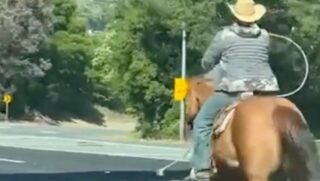Being an educator is no easy task, but it is highly rewarding. Being and FFA advisor on top of that, doubles the reward – and, perhaps, the stress. When we think of ways to reach future generations about agriculture, an ag teacher — who is often also an FFA advisor — shouldn’t be overlooked nor underappreciated. It’s astonishing the number of hours they spend inspiring students to become the best FFA member they can be. Without their determination, FFA chapters wouldn’t be as strong a force as they are. All it takes is one person to believe in the future of agriculture, the future of young adults, and the future of FFA.
Jeremy Knox, an ag teacher and FFA advisor in Conecuh County, Alabama, is working diligently every day to create a positive experiences for his students. He wants them to be inspired the way he was inspired: by a high school ag teacher (his was named Ricky Bass). Despite denying the fact that he didn’t want to teach agriculture, his peers, and even Bass himself, didn’t accept Knox’s denial. His classmates referred to him as, “Ricky Jr.,” because he reminded them so much of their teacher. During his senior year, Bass allowed Knox to “see what things were like on the other side of the desk,” and the rest, as they say, is history.
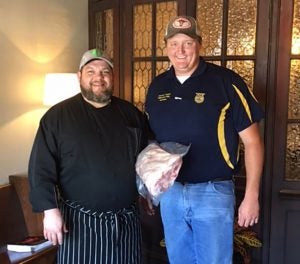
Knox attended Auburn University after receiving his associate’s degree. He received his bachelor’s in ag education, got his master’s, and is close to finishing his Ph.D. He teaches at Hillcrest High School, a job he took after he married his wife, Amy, and moved to Evergreen, Alabama. They have two little girls, Katherine “Kaydee” Pearl, a spunky 3-year-old, and Kennedy Ann, who is 3 months old. Knox strives to lead and inspire his family the same way he strives to lead and inspire his students.
His FFA chapter is very hands-on with its roughly 100 students, who all share the responsibility of an on-campus farm. This includes six commercial cows, three bulls, and two heifer calves, as well as one boar, and a sow that averages about 14 piglets per litter. Their meat is sold in restaurants and grocery stores in the area. About 10 students have animal projects, and since some of the students can’t afford to keep their projects at home, Knox and the school allow the students to keep them on the farm. He does this to break down barriers for students in hopes to give them an opportunity they might not otherwise get to experience
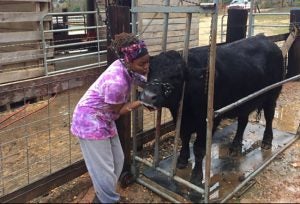
On the plant side, they have a hoop house where they grow seasonal crops while also managing a community garden. Students run a blueberry operation that allows them to learn how to harvest and market their crop. They also have a standard ag shop, so students who don’t flourish with animals or plants can find their own skill set. (For example, these students have built furniture for the community.) Knox ensures all students are heavily involved in every aspect of the farm, while still enhancing their strengths.
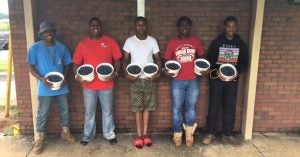
One of Knox’s top struggles when it comes to teaching agriculture, and advising an FFA chapter, is telling his kids that agriculture is so much more than production farming. It involves everyone, from the farmer and rancher, to the consumer in the city. Knox also stresses to his students that working hard isn’t something to be scoffed at. He wants them to know that working with their hands isn’t beneath them. Equality in the workforce is important in his curriculum, “This country was made by people who weren’t scared to get their hands dirty,” and he wants students to know that any job within the industry is worthy of respect, from blue collar, to white.
With every struggle, though, comes twice as many triumphs. Knox enjoys the moments when he can see in a student’s eyes that what he is teaching has clicked with them. He thinks it is especially rewarding when students who struggle ultimately persevere.
“When you’ve got an FFA student that has been trying really hard to memorize the creed,” Knox says, “and they get it down and they are going to be your creed speaker, and they work and work and work, and then they finally end up placing at district, and, you know, maybe go to state. Or you’ve got a student that has worked really hard and wants to be an officer at the chapter level and then they pursue it on to the district and state level and they work really hard and they get in. They may not always win, but they get the experience.”
He says, “Those times when they do win, the look on their face is, ‘Hey look, I had a part in that.’ It’s not all me, but I had them in the right place and they made the right decisions and they capitalized on it. …
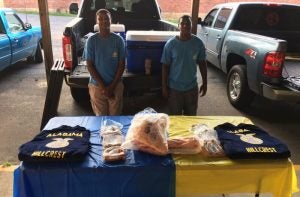
“We showcase what kind of work these students can do, and how they can be productive members of society and also go into the workforce. Whether it’s going into the workforce in a carpentry trade or being able to take care of something at their home one day. I want every student that leaves my class to be able to be self-sufficient. Whether that means thinking for themselves, or being able to fix a leak, wire an outlet, build a deck, etc., have practical knowledge so that they can take care of themselves,” he says.
So, thank a farmer, thank a rancher, but just as important, thank an FFA advisor. They sacrifice nights, weekends, family time and free time, to help you succeed, not only in FFA, but in life as well.
Markie Hageman majored in agribusiness at Fort Hays State University. She is actively involved in her state Cattlemen’s Association, Young Farmers chapter, and National Cattlemen’s Beef Association. Her AGDAILY.com articles can be found here.


